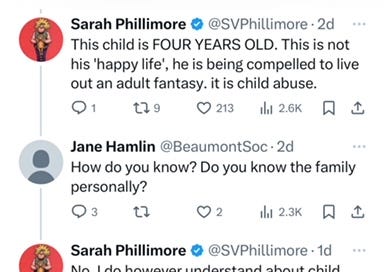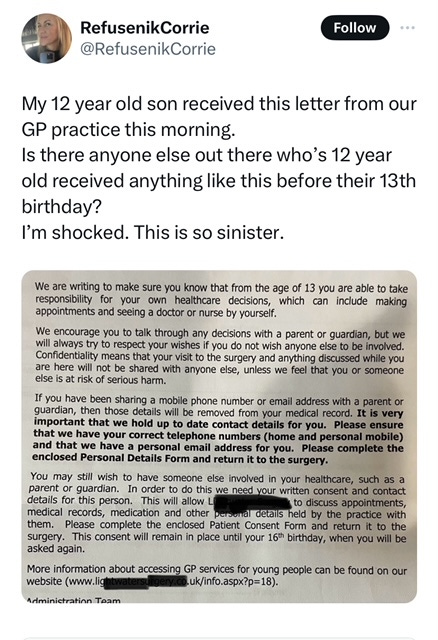Children's capacity to consent to transition
An important battleground gender identity ideology is that involving children. To what extent can they consent to social or medical transition? And what rights, if any, do parents have to object?
I do not think it is a coincidence that my recent social media postings involving children and their capacity to consent, have achieved a level of engagement unprecedented in the last ten years. This is a reflection on a key battleground in the ‘gender wars’.
If ‘gender identity’ is recognised as something which is vital to recognise and protect, even in very young children and even to the extent of compromising their fertility, bone density, neurological function and adult sexual function, then its status as an ‘organising category’ which supercedes sex, is secured.
I commented in horror at this recent article in the Telegraph about a 4 year old boy who started primary school as a girl, then three years later was ‘flashing his willy’ to his female friends, one at least who was sufficiently upset to tell her mother. In objecting to this deliberate deception of primary school children, I was told I was a paedophile, obsessed with children’s genitals or insufficiently respectful of a 4 year old’s ‘demands’.
I also remarked on a letter sent to a mother in England regarding her son which told him that as of 13 he is able ‘to take responsibility for your own health care decisions’. I remarked that I did not think this was lawful as it was assuming that a 13 year old was competent to do this, rather than recognising that competence needed to be assessed if a child is under 16.
I was met with 100s of comments, many from US citizens, accusing me variously of egregious stupidity and treating children like property. At the time of writing the mother’s post has been seen 5 million times.
So what is going on? Why does the concept of a child’s competence generate such heat? Why is it apparently so difficult for so many to accept that children are vulnerable by reason of their cognitive development and may desperately need boundaries to be set by parents or carers? I thought it might help to go back to basics.
Child development, statute and case law.
The law in this area is relatively simple. You need to understand the interplay between parental responsibility and capacity and this is done by looking at both statute and case law.
Children are defined as humans between the ages of 0-18. But the difference between a toddler and a teenager is vast. For further discussion about ages and stages of child development, see ‘When can a child consent to medical transition?’ co-authored by Transgender Trend and EBSWA. 12 appears to be a significant age when most children are at the stage of ‘formal operations’ - i.e. they move away from ‘concrete thinking’ to abstract and deductive reasoning.
The law reflects what we know about child development; age and understanding increases as the child grows. Children over 16 are given a statutory presumption of capacity in a variety of areas - see para 26 of D (A Child) (Rev2) [2019] UKSC 42 (26 September 2019) Section 8(1) of the Family Law Reform Act 1969 provides that the consent of a child of 16 to any surgical, medical or dental treatment “shall be as effective as it would be if he were of full age”
So what about children under 16? The concept of ‘Gillick competence’ arises from the case of Gillick v West Norfolk and Wisbech AHA [1985] UKHL 7 where Victoria Gillick was unhappy with the idea that her 15 year old daughter might be prescribed contraceptives. The House of Lords - now the Supreme Court - ruled against her and recognised that the capacity of a child to make serious decisions will increase alongside his age and understanding. Does the child understand the risks and benefits of any proposed treatment and can weigh and retain that information? If so, ‘parental responsibility’ may no longer bite; the child can override a parents’ wishes, or even ensure that the parent is not included in any decision making. Difficult cases may require court intervention; it is possible for the court to overrule a competent child, but this will require careful analysis.
‘Parental responsibility’ is the other end of the see saw from capacity. It is defined at section 3(1) of the Children Act 1989 as “all the rights, duties, powers, responsibilities and authority which by law a parent of a child has in relation to the child and his property.”
The House of Lords in Gillick approved the following dictum of Lord Denning MR
… the legal right of a parent to the custody of a child … is a dwindling right which the courts will hesitate to enforce against the wishes of the child, and the more so the older he is. It starts with a right of control and ends with little more than advice.
It is the interplay between parental responsibility and Gillick competence which seems to be poorly misunderstood or even actively misrepresented. ‘Parental responsibility’ means what it says on the tin. It is not a wish to treat children like property or cruelly deny them their own choices. It is a recognition of the inherent vulnerability of young children and the legal (and moral) obligations on parents to keep them safe as they grow.
The need to protect vulnerable children
We can safely assume that most parents, most of the time, have their children’s best interests at heart. Parents are likely to be an important part of decisions around keeping children safe. Who else is advocating for the child?
Families are also the ‘breeding ground of diversity’ and entitled to special protection, as was set out by Lady Hale in para 73 of The Christian Institute & Ors v The Lord Advocate (Scotland) [2016] UKSC 51 (28 July 2016):
Individual differences are the product of the interplay between the individual person and his upbringing and environment. Different upbringings produce different people. The first thing that a totalitarian regime tries to do is to get at the children, to distance them from the subversive, varied influences of their families, and indoctrinate them in their rulers’ view of the world. Within limits, families must be left to bring up their children in their own way.
Safeguarding concerns around transitioning children need careful assessment. Competence in children under 16 cannot simply be assumed to exist without assessment. In the area of medical transition, most 15 year olds probably are Gillick competent - but not all will be. Most 12 year olds will not be Gillick competent - but some might.
As the Cass Review noted, the existing evidence base for the efficacy of medical transition is very poor. It is inevitable that the welfare of children will be compromised if their capacity is assumed in an environment where various lobby groups promote transition as inherently positive, and any challenge ought to be outlawed as ‘criminal conversion therapy’.
The campaigning charity Mermaids takes the view that a child of any age who says they are trans, is trans and this must be respected. Alarmingly, this view has found favour in a decision of the High Court, Lancashire County Council v TP & Ors (Permission to Withdraw Care Proceedings) [2019] EWFC 30. The Judge found nothing curious about two unrelated children in the same foster care placement, apparently expressing a wish to transition when aged 4 and 7, and their capacity to do so, even at such very young ages was apparently assumed.
Making sure that a child’s capacity to consent to medical treatment is not only to protect the child but the medical practitioners; without consent to treatment, unless he or she can plead emergency, the practitioner is wide open to regulatory, civil or even criminal action. As the Court of Appeal commented in Bell v Tavistock in 2021, para 92
We should not finish this judgment without recognising the difficulties and complexities associated with the question of whether children are competent to consent to the prescription of puberty blockers and cross-sex hormones. They raise all the deep issues identified in Gillick, and more. Clinicians will inevitably take great care before recommending treatment to a child and be astute to ensure that the consent obtained from both child and parents is properly informed by the advantages and disadvantages of the proposed course of treatment and in the light of evolving research and understanding of the implications and long-term consequences of such treatment. Great care is needed to ensure that the necessary consents are properly obtained. As Gillick itself made clear, clinicians will be alive to the possibility of regulatory or civil action where, in individual cases, the issue can be tested.
I hope you found it useful, this fairly brief canter through the law surrounding children, capacity and consent in England and Wales. I do not presume to speak for any other jurisdiction.
Clearly, given the howls of rage and accusations from US citizens on social media, regarding my vast and offensive stupidity. they do things very differently there.
I think that is a great tragedy for their children.





There is no such thing as "gender identity." There is no such thing as "trans." Adults cannot "transition" because sex is binary and immutable. Nobody gives 70 pound anorexics liposuction, and nobody should give men estrogen due to their mental delusions. That is the only conclusion that can be reached here, and that is the only approach that will work.
"There's a tiny percentage of REAL trannies!" or "Adults can do what they want!" will not work. Because neither statements are true.
Likewise, children obviously cannot consent to any of this. Children engage in magical and imaginative thinking, and that's all this is. As adults do not have "gender identity" because nobody does, neither do children. Children say that they are Superman or horses as well--it's the same thing.
A study was done where doctors found and interviewed children who had insisted they were the opposite sex while they were young, but ultimately they grew out of it and never engaged in mutilation surgeries or opposite sex hormones. The vast majority of them didn't even remember any of their statements--they literally forgot they had even said any of it. Thank goodness they didn't ruin their bodies and lives.
Ask any boy who says he's actually a girl and it will boil down to two things--clothing and toys. That's all children understand. Boys who want to play with dolls and wear skirts literally think they're girls. They're not. They need to be told that they can wear and play with what they like, but they're male and always will be. Children would also eat ice cream for every meal if they could. They need to be told no.
Furthermore, the short-term goal of the "trans" lie is normalization of pedophilia. That is explicitly its goal, ever since John Money's "work." If children can consent to "gender transition" they can consent to sex. There are plenty of adult males waiting to take advantage of this. Do I really need to explain this?
So, the answer is no. To all of it. Children, adults, everyone. There is just no such thing since "gender" is a linguistics term that only applies to words and cannot apply to humans, and pedophiles should be shamed.
End of story.
Thanks once more for your excellent exposition of the law around this!